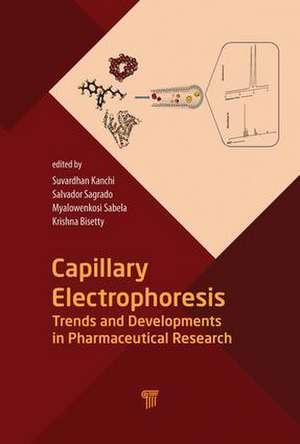Capillary Electrophoresis: Trends and Developments in Pharmaceutical Research
Editat de Suvardhan Kanchi, Salvador Sagrado, Myalo I. Sabela, Krishna Bisettyen Limba Engleză Hardback – 10 aug 2017
Preț: 548.10 lei
Preț vechi: 729.82 lei
-25% Nou
Puncte Express: 822
Preț estimativ în valută:
104.88€ • 112.15$ • 87.45£
104.88€ • 112.15$ • 87.45£
Comandă specială
Livrare economică 28 martie-11 aprilie
Doresc să fiu notificat când acest titlu va fi disponibil:
Se trimite...
Preluare comenzi: 021 569.72.76
Specificații
ISBN-13: 9789814774123
ISBN-10: 981477412X
Pagini: 410
Ilustrații: 75
Dimensiuni: 152 x 229 x 30 mm
Greutate: 0.82 kg
Ediția:1
Editura: Jenny Stanford Publishing
Colecția Jenny Stanford Publishing
ISBN-10: 981477412X
Pagini: 410
Ilustrații: 75
Dimensiuni: 152 x 229 x 30 mm
Greutate: 0.82 kg
Ediția:1
Editura: Jenny Stanford Publishing
Colecția Jenny Stanford Publishing
Public țintă
Academic, Postgraduate, and Professional Practice & DevelopmentCuprins
Capillary Electrophoresis: A Versatile Technique in Pharmaceutical Analysis. Recent Applications of Chiral Capillary Electrophoresis in Pharmaceutical Analysis. A Mini-Review on Enantiomeric Separation of Ofloxacin using Capillary Electrophoresis: Pharmaceutical Applications. Nano-Stationary Phases for Capillary Electrophoresis Techniques. Capillary Electrophoresis Coupled to Mass Spectrometry for Enantiomeric Drugs Analysis. Enantioselective Drug–Plasma Protein-Binding Studies by Capillary Electrophoresis. Clinical Use of Capillary Zone Electrophoresis: New Insights into Parkinson’s Disease. Electrophoretically Mediated Microanalysis for Evaluation of Enantioselective Drug Metabolism. Capillary Electrophoresis for the Quality Control of Intact Therapeutic Monoclonal Antibodies. Molecular Simulation of Chiral Selector–Enantiomer Interactions through Docking: Antimalarial Drugs as Case Study.
Recenzii
"Decades after its introduction, capillary electrophoresis has evolved into a mature technique, especially in the field of pharmaceutical analysis. This book focuses on a number of fields in which this separation technique has proven its unique usefulness, such as chiral separations and the analysis of protein biopharmaceuticals. It highlights the current state of the art and offers high-quality general chapters and overviews as well as topical chapters. Recommended reading for all those involved in pharmaceutical analysis, albeit academically or industrially!"
—Prof. Ann Van Schepdael, University of Leuven, Belgium
—Prof. Ann Van Schepdael, University of Leuven, Belgium
Notă biografică
Suvardhan Kanchi is a research scientist in the Department of Chemistry, Durban University of Technology (DUT), South Africa. His current research involves method development to separate organic and inorganic molecules from environmental samples using CE. He is also interested in fabrication of electrochemical nano-biosensors for high-intensity artificial sweeteners, bisphenols, and dyes.
Salvador Sagrado is full professor in the Department of Analytical Chemistry, Universitat de València (UV), and secretary of the Interuniversity Research Institute for Molecular Recognition and Technological Development (IDM), Universitat Politècnica de València, Spain. His current research focuses on chemometrics and enantioselectivity.
Myalowenkosi Sabela is currently conducting doctoral research at DUT and has been a recipient of the Erasmus Mundus-EUROSA fellowship 2014–2015. His research interest is in pharmacokinetic and enantioselective parameters of pharmaceutical compounds in the presence of biomacromolecules and nanoparticles for applications such as diagnostics and sensors.
Krishna Bisetty is head of the Department of Chemistry at DUT. His current research is largely based on high-performance computing ranging from small organic molecules to bioactive macromolecules including the development of computational models for the design of more effective host–guest systems using state-of-the-art molecular dynamics and docking simulations supported by experimental studies.
Salvador Sagrado is full professor in the Department of Analytical Chemistry, Universitat de València (UV), and secretary of the Interuniversity Research Institute for Molecular Recognition and Technological Development (IDM), Universitat Politècnica de València, Spain. His current research focuses on chemometrics and enantioselectivity.
Myalowenkosi Sabela is currently conducting doctoral research at DUT and has been a recipient of the Erasmus Mundus-EUROSA fellowship 2014–2015. His research interest is in pharmacokinetic and enantioselective parameters of pharmaceutical compounds in the presence of biomacromolecules and nanoparticles for applications such as diagnostics and sensors.
Krishna Bisetty is head of the Department of Chemistry at DUT. His current research is largely based on high-performance computing ranging from small organic molecules to bioactive macromolecules including the development of computational models for the design of more effective host–guest systems using state-of-the-art molecular dynamics and docking simulations supported by experimental studies.
Descriere
Capillary electrophoresis (CE) has become an established method with widespread recognition as an analytical technique of choice in numerous analytical laboratories, including industrial and academic sectors. Pharmaceutical and biochemical research and quality control are the most important CE applications. This book provides a comparative assessment of related techniques on mode selection, method development, detection, and quantitative analysis and estimation of pharmacokinetic parameters and broadens the understanding of modern CE applications, developments, and prospects.
